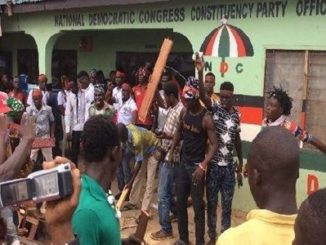
The world has never been short of givers.
From the precious gift of life itself through knowledge to wealth, numerous people across the world have given a piece of themselves to help create a better society for others and the rest of the world.
While giving is self-gratifying, not all are able to do it.
The reasons may vary but the central point is who gives what he or she does not have?
Thus, is it not strange that at a time when our government is looking for funds and resources to enhance the country’s fight against the spread of the novel Coronavirus (COVID-19), not a single individual has been able to reach out with support yet?
Philanthropy during crisis
An age-old gesture, philanthropy is timeous and more humane when carried out in a time of need; a time like this when a strange ailment has emerged and is threatening to put all lives on hold and suffocate individual economies and the global economy as a whole.
In the wake of the novel COVID-19, many individuals and institutions across the world have voluntarily put their best feet forward to help contain the spread of the viral disease, make life bearable for those infected, contain its impact on countries or find a cure for it.
Mr Aliko Dangote is one of those people.
Our Nigerian neighbour and Africa’s richest man, Mr Dangote, on March 4, donated the equivalent of $550,000 to the Nigerian government to be used to support its efforts to curb the spread of the COVID-19 in his country.
The amount was pledged by the Aliko Dangote Foundation (ADF), the philanthropic wing of the billionaire’s chain of businesses under his Dangote Group.
According to the Nigerian media, the donation was the first of its kind and the biggest so far by a corporate institution and citizen towards supporting the country’s efforts to curb the spread of the viral disease.
Elsewhere, Mr Jack Ma of Alibaba and Mr Bill Gates of Microsoft, among other wealthy persons, are making lofty donations to help their countries and other countries fight the pandemic.
Beyond donating $14 million to fight the disease globally, Mr Ma has promised to supply a total of 1.1 million testing kits, six million masks and 60,000 protective suits and face shields to African countries.
Under his gesture, each African country could get 100,000 face masks, 20,000 testing kits and 1,000 protective clothing to boost their right against the virus.
Case of Ghana
Here in Ghana, President Nana Addo Dankwa Akufo-Addo has announced that the government has allocated $100 million to enhance the country’s preparedness and response plans to the COVID-19.
But unlike Nigeria, where Mr Dangote has supported the government’s efforts with the sizeable amount of cash, here in Ghana, not a single Ghanaian has been able to donate a penny to support the cause.
This loud silence of citizen’s support through financial donations to the country’s fight against the COVID-19 spread begs the question: where are Ghana’s ‘Dangotes’ and ‘Jack Mas’ and how do we create some in preparedness for the next crisis?
While it may be early days yet, it goes without saying that nobody gives what he or she does not have. Unlike Ghana, Nigeria and other nations are blessed with multiples of wealthy persons whose wealth continues to rub on their countries and the less privileged.
This happens in ways similar to the contribution made by Mr Dangote and Jack Ma towards the fight against the COVID-19 spread.
In spite of having its flaws like Ghana does, Nigeria and other countries have over the years, created conducive environments that allowed business ideas to thrive and strengthen into giant multinationals.
These businesses birthed the rich and wealthy, whose wealth have not been seen as threats to political establishments, but a necessary part of a whole and general good of the country.
Political lenses
What then prevents Ghana from also benefiting from the wealth of its citizens? Ghana must, but to do that the country needs to create its own wealthy citizens.
This is where our political environment and the mindset of those who lead, need to change.
Our political governance structure concentrates power in the executive arm and that makes it possible for the actions of the occupants to either bless or poison the entire country.
Due to political expediencies, many business ideas that would have created wealthy and multimillion dollar Ghanaians, multinational companies and big-time employers have been crashed or marginalised.
Local businesses are hardly given support and those that get it do so through unsustainable methods. We appear to prioritise political patronage over national good and, therefore, see everything through political lenses.
It explains why we create environments that grow foreign businesses over local ones, are prompt to choose foreign firms over local ones for contracts and whenever local firms get to do some of the contracts, payments become a headache.
These need to change if we are to raise our own Dangotes, Jack Mas and the rest.
Building our own
After 63 years of political independence, we need to be more concerned about what we have used the freedom our forebears fought so hard to attain for beyond having the right to choose who among us rules the nation.
We need to be concerned about how much of the economy really belongs to us, Ghanaians, and how we can use the state’s overwhelming power to create individuals, who can own a chuck of our own economy rather than using it to crash them.
We need to genuinely create a system that blesses our environment with a ‘Ghana first’ mentality rather than poisoning it with ‘party first’ attitude.
Given the intellect and the hardworking nature of the Ghanaian, there is no gainsaying that we can create our own ‘Dangotes’ and ‘Jack Mas’ right here in Ghana.
That should be a national priority through which all of us can objectively contribute our ideas and resources to building the next generation of Ghanaians, whose wealth will help the government to fight pandemics.
While doing that we need to be aware that in the individualistic sense, those rich people could be single persons, whose wealth and affluence remain their private property until a time when they decide to share.
In the broader sense of things, however, the wealthy are the anchor of the nation through which its might is defined and economy expanded.
Therefore, by empowering people to be wealthy through a conducive, fair and objective environment, the country would build a safety net and a support system for rainy days such as this, when the donations of wealthy entrepreneurs are most needed.
The writer is a businessman and philanthropist who was significant shareholder in the collapsed Heritage Bank Ghana Limited
–
Credit: Daily Graphic



